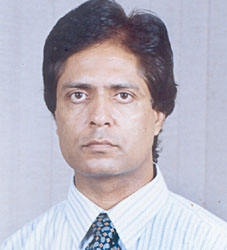Why Justice Katju Hates Indian Journalists
You must listen to Justice Markandey Katju carefully when he says Indian journalists are working against the national interests, they aggravate communal tension with their wrong reporting, they’re intellectually weak, and so on.
By Rakesh Raman
Justice Katju is the new chairman of the Press Council of India, a statutory body set up to govern the conduct of the print and broadcast media in India. In a recent TV interview, Katju, a retired judge of the Supreme Court of India, didn’t mince his words when he lambasted Indian journalists and media companies with the same cane.
Obviously, a strong reaction came from a section of the media that wanted Katju to apologize for his harsh remarks. But was he right or wrong in his observations? Let’s analyze Katju’s pain points, which are mainly about the professional incompetence of print and broadcast journalists.
In his remarks, Justice Katju said that Indian journalists are not competent enough in their professional field. As they’re not well-read, they hardly know about the economic theories, political science, literature, and so on. And their lack of knowledge is reflected in their output.
While Katju is absolutely correct with his observations, I’d say his expectations are very high from the Indian journalists. Let alone economic and political theories, I’ve seen people in Indian media who don’t know how many millions are in a billion and how many crores (a measure used in India) are in a billion. These conversions are often required while covering global developments. Even business journalists don’t understand basic concepts such as CAGR (Compound Annual Growth Rate), etc.
The situation is worse in highly specialized fields like science and technology. In the area of information technology (IT), for example, the so-called journalists have some very basic, user-level understanding of computers. But surprisingly they’re writing on the most complex tech topics. As a result, their published write-ups are not even readable.
Don’t be surprised if a journalist, who covers, say, commodity items like wheat and pulses, is also reporting on cyber security or the war in Afghanistan. As most journalists don’t specialize in any field, they don’t even know what to ask from the experts to make a presentable report for mass consumption. Worse, they don’t understand the difference between objective reporting and subjective views in journalism. This lack of understanding is clearly visible in their work.
For example, they’ve the same dull interview questions for a dog-food company or a microprocessor manufacturer. Their ordinary questions range from “what do you think,” “what’s your reaction,” or “what are your plans” instead of challenging the respondent with their own knowledge in the field.
The broadcast media companies, in particular, are full of naïve workers. For example, you can invariably see TV channels showing opinion polls with only percentages of respondents in favour of or against something. Even a school kid can tell them that mere percentages in a poll are meaningless without giving the absolute number of respondents. Why do these channels need Justice Katju to teach them even such a basic statistical rule?
Moreover, the TV announcers are not supposed to selectively nod or say “yes, I agree” or “absolutely” types of approvals to what some of their favourite panellists say in a program. As a media outfit, you’re not supposed to carry any bias and falsely influence public opinion.
And surprisingly there are only a handful of panellists who seem to be so idle that they appear in every TV show on every channel. Strange but true.
You’d agree that media content is a factor of knowledge. As Indian journalists lack knowledge, there’s always a dearth of good content. So, you see TV channels showing useless programs on fashion shows, some ordinary Bollywood (loose term for Indian film industry) actors, and surfeit of cricket, as Justice Katju blames. Same is true for newspapers and magazines while radio and online media content has few takers.
Actually, the poor quality of education in almost all media schools is among the main reasons for this sorry state of affairs. Teachers in such schools are totally clueless about the fundamentals of journalism and the fast-changing trends in the global media world.
Today, with the proliferation of Web media, which is attracting all types of readers or viewers, your communication needs to be balanced and engaging to attract eyeballs on your traditional media reports.
Old-fashioned rules of language, sentence construction, paragraphing, program formatting, manner of speaking, content value addition, etc. have already undergone a seismic shift in the well-behaved global media markets. But Indian media ecosystem is still staggering in the Stone Age.
As teachers in media schools and senior journalists in media companies are wearing blinkers, they’re not fully aware of the changing demands of the information consumers. And they’re not even ready to learn. Consequently, the new breed of mass communication workers continues to be of bad quality.
And most follow unethical practices. They accept gifts and foreign junkets openly from the organizations that want coverage. How can you expect fair reporting from a journalist who has enjoyed the hospitality of the company seeking publicity? If media companies think their journalists’ tours are important, why can’t they foot the bill?
Top media companies in the world have their ethics code clearly spelt out on their sites. For example, here’s The BusinessWeek Code of Journalistic Ethics. And even individual writers explicitly inform about the ethics they follow. Tech writer Walt Mossberg of The Wall Street Journal, for instance, says: “I don’t accept any money, free products, or anything else of value, from the companies whose products I cover, or from their public relations or advertising agencies. I also don’t accept trips, speaking fees, or product discounts from companies whose products I cover, or from their public relations or advertising agencies.” Read his full statement of ethics.
But Indian companies and their journalists work in the most irresponsible and freewheeling manner. They don’t observe any such ethics or professional standards. So, it affects their work and credibility.
As if that’s not enough, most media companies are running in a mad scramble to make a fast buck by hook or by crook. As they’re not able to produce quality content, they’ve started distributing sponsored awards of various kinds to further damage their reputation.
This is a highly immoral practice for media companies that are breaking their ethical limits to distribute commercially influenced awards. Your business is to sell news. If you’re not able to create sellable news, you’re not supposed to create another shady business under your news activity.
With all these irregularities happening in their backyard, Indian media companies and their journalists must be thankful to Justice Katju that he used only some mild words to highlight the realities. But things are not going to change so easily.
In fact, Indian journalists will take a lot more time to learn about their own profession. For the time being, they must learn to see the mirror that Justice Katju has shown them in the most sensible way. Thank you, Justice Katju.
By Rakesh Raman, the managing editor of Raman Media Network.
You can also read: More Articles by the RMN Editor, Rakesh Raman
[ Also Visit: RMN Community Court Service for Online Justice ]





Well written Rakesh! I think we should keep Indian media free of any governmental control and let it play out. However, we should have such debates as raised by Justice Katju more often.